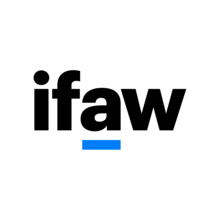International Fund for Animal Welfare
The International Fund for Animal Welfare , IFAW (German International Animal Welfare Fund ), is a global animal welfare organization .
history
1969, a group founded by activist Bryan Davis in Canada IFAW with the aim of the commercial hunting of harp seals to end in Canada. In the 1980s, an EU import ban on white skins was achieved. However, as the commercial seal hunt continued, IFAW advocated a trade ban with the EU that went into effect in 2009.
The organization now has more than 200 employees worldwide, including in Germany since 1986 with an office in Hamburg . Furthermore, she is u. a. represented in the USA , Canada , Australia , Russia , India , China , Africa , the Netherlands , Belgium , France , Japan and the United Kingdom .
organization structure
The IFAW team consists of helpers, educators , lawyers and communication experts as well as scientists. The organization has around 1.2 million sponsors worldwide who support the work of IFAW. The organization is headquartered in Yarmouth Port, Cape Cod in Massachusetts , USA. Azzedine Downes is currently President of IFAW.
activities
IFAW works on issues such as whales and whaling , elephants and ivory , trade in wildlife , dogs and cats, and rescuing harp seals. Campaigns should improve the situation of these animal groups and draw the public's attention to the problems of appropriate animal welfare . Political work is an important instrument for IFAW in order to achieve the desired goals.
IFAW focuses in its work on three areas:
- The reduction in the commercial yield of animals
- Protection of wildlife habitats
- Immediate aid for animals in need after a disaster
The destruction of natural habitats is a threat to humans and animals. For this reason, IFAW supports local authorities and national parks that are committed to protecting animals and the environment , e. B. in training their rangers . In its work, IFAW focuses primarily on solutions that defuse the conflict between humans and animals. The goal is to provide concrete help to local communities in their everyday encounter with wildlife. The IFAW also maintains protection stations in which animals in need are rehabilitated. Examples of such projects are the “Grizzly Bear Rehabilitation Project” in Canada or the Bear Rehabilitation Station in Russia, where orphaned bear cubs are raised and later released into the wild.
Emergency aid for animals in need is guaranteed by the animal rescue team. It helps injured or orphaned animals. The team also takes care of the care and subsequent rehabilitation of the animals affected, such as oil-smeared seabirds , stranded whales and dolphins, as well as domestic and farm animals after natural disasters .
Partnerships
In Bosnia, IFAW, together with the United Nations Development Program UNDP, is helping several municipalities to develop sustainable concepts for solving their problems with street dogs.
IFAW has also been working with INTERPOL for more than ten years to stop the illegal wildlife trade. In addition, IFAW cooperates with the Clinton Global Initiative , founded by Hillary Clinton , to take action against the illegal trade in ivory.
IFAW is committed to international conferences such as the Conference of the Parties to the Washington Convention on Species Protection, the International Whaling Commission IWC, the Bonn Convention CMS and the General Assembly of the UN Environment Program UNEP for the protection of animals and species.
Animal Action Week
The Animal Action Week is a project introduced by IFAW and awarded by UNESCO , with the help of which children and young people are informed about topics relevant to animal welfare. Every year on World Animal Day on October 4th, the activities start with a different focus. In cooperation with schools, young people are informed about the problems of nature and animal protection that are primarily caused by humans.
successes
IFAW began operating in the 1970s as a campaign against commercial seal hunting on the east coast of Canada . Protests by IFAW and other organizations such as B. Sea Shepherd and Greenpeace this hunt is now banned. However, hunting seals between the ages of twelve days and three to four weeks is still allowed. However, there has been an import ban on seal products for the EU since 2009. The hope is that this will rob the commercial seal hunt of its economic basis and that it will be stopped by Canada.
Thanks to several legal opinions initiated by IFAW since 2005, and thanks to IFAW's sustained persuasion, the Australian government decided to take legal action against whaling in Japan and filed a lawsuit with the International Court of Justice. The latter then decided in March 2014 that Japanese whaling in Antarctica is illegal under international law and that Japan will no longer be allowed to hunt whales in Antarctica in the future.
criticism
Charitywatch criticizes that project and administrative costs are not clearly separated. The NDR reports that inappropriate commissions are being paid to third parties.
Web links
- www.ifaw.org/de - IFAW Germany
- www.ifaw.org/ca - IFAW International (in English)
Individual evidence
- ↑ http://www.ifaw.org/deutschland/unsere-arbeit/hunde-und-katzen/part Partnerschaft-mit-undp-f%C3%BCr-stra%C3%9Fenhunde- bosnien
- ↑ http://www.ifaw.org/deutschland/aktuelles/ifaw-kooperiert-mit-der-clinton-global-initiative-%E2%80%93-ein-meilenstein-zur-rettung-der-elefan
- ↑ Archive link ( Memento of the original from April 3, 2016 in the Internet Archive ) Info: The archive link was automatically inserted and not yet checked. Please check the original and archive link according to the instructions and then remove this notice.
- ↑ Top UN court bans Japan whaling in Antarctica ( Memento from July 7, 2014 in the Internet Archive )
- ↑ http://www.ifaw.org/deutschland/aktuelles/ein-gro%C3%9Fartiger-erffekt-f%C3%BCr-den-walschutz
- ↑ When the animals don't get the money. Deutschlandfunk, September 30, 2011.
- ↑ Postage alone costs millions. Charity watch, October 6, 2011.
- ↑ Criticism of aid organizations: Lack of transparency in Internet donations NDR, December 6, 2011.
